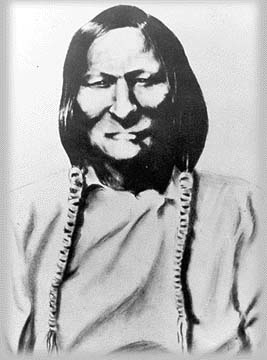“We want to take good tidings home to our people, that they may sleep in peace.”
Speaking to Colorado Governor Evans, Colonel Chivington, Major Wynkoop and others in Denver (Autumn 1864), as quoted in The Boy's Book about Indians : Being What I Saw and Heard for Three Years on the Plains (1873) by Edmund Bostwick Tuttle, p. 61
Contexto: We have come with our eyes shut, following Major Wynkoop's handful of men, like coming through the fire. All we ask is that we have peace with the whites. We want to hold you by the hand. You are our father. We have been traveling through a cloud. The sky has been dark ever since the war began. These braves who are with me are willing to do what I say. We want to take good tidings home to our people, that they may sleep in peace. I want you to give all these chiefs of the soldiers here to understand that we are for peace, and that we have made peace, that we may not be mistaken by them for enemies. I have not come here with a little wolf bark, but have come to talk plain with you.
